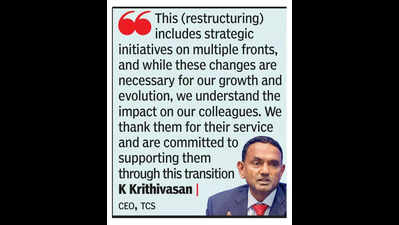Tata Consultancy Services to axe 12,000 jobs, IT firm’s biggest layoff ever | Bengaluru News

Bengaluru: In what might be one of the largest announced layoffs by an Indian IT firm, TCS is planning to cut 2% of its workforce—over 12,000 employees—this year, with the reductions primarily affecting mid-level and senior executives. The planned workforce reduction—long considered rare in the industry—underscores the tough demand environment, especially in the absence of large deals like BSNL. Industry observers see this as an early sign of a broader shift, where rising reliance on automation and margin pressures are driving companies to reduce employee costs. This move marks one of the company’s most significant strategic shifts, investing in newer areas like AI, data, and cybersecurity, embracing AI, and letting go of employees who cannot be redeployed within the firm.TCS said the restructuring initiative aimed at transforming the company into a future-ready organisation. “This includes strategic initiatives on multiple fronts, and while these changes are necessary for our growth and evolution, we understand the impact on our colleagues. We thank them for their service and are committed to supporting them through this transition,” TCS chief executive officer K Krithivasan said in an email to employees. “While this is a difficult decision, it reflects our continued responsibility as an organisation to anticipate future needs and act decisively.”The move, the email said, is part of TCS’s broader strategy to invest in new technologies, expand into new markets, and enhance its AI capabilities. TCS emphasised that the transition was carefully planned to ensure no disruption to service delivery for its clients. The company provided appropriate benefits, outplacement services, counselling, and support to help affected employees transition to new opportunities.The decision followed a recent revision of the bench policy, which required employees to be billed to a project for 225 business days a year or face termination. Recently, TCS deferred the onboarding of 650 lateral hires amid project delays. Speaking to TOI after the quarterly earnings, Krithivasan said: “Associates are expected to reskill and be flexible about assignments. Eventually, projects depend on client needs, not individual preferences,” he stated. TCS invested heavily in upskilling and expected faster internal deployments once those capabilities were in place.When asked about speculations about withholding salaries for employees on the bench for extended periods, Krithivasan clarified that the company expects proactive efforts from associates to seek new roles internally, “We don’t want anyone benched too long—it doesn’t help them or the company.”Phil Fersht, CEO of HfS Research, said the impact of AI is eating into the people-heavy services model and forcing the large service providers such as TCS to rebalance their workforces to maintain their profit margins and stay price competitive in a cutthroat market where clients are demanding 20%-30% price reductions on deals. “The fact that TCS has taken this step is a major indicator of this trend, considering its culture of being a very stable place to work.“Peter Bendor-Samuel, founder chairman of the Everest Group, said the offshore labour arbitrage industry has hit maturity with growth likely to be flat to slightly up for the foreseeable future. “On top of that, AI is creating substantial efficiencies requiring fewer people. The combination of factors is forcing TCS and other firms to shrink their labour forces. This is likely the start of a broader trend for both TCS and the rest of the industry.“The reduction is not limited to TCS. During the recent earnings calls, HCLTech CEO Vijayakumar said, “We plan to optimise underutilised facilities, mainly outside India, including those from acquisitions. Second, there will be a talent reduction, particularly in certain geographies outside India. We will share more details once we finalise the timeline and plan.”stry experts believe that hiring is largely concentrated in niche areas such as AI, cloud, and cybersecurity, with ramp-ups occurring primarily through large deal wins. “Most new jobs are tied to specific projects or organisational changes, rather than large-scale hiring drives. This cautious approach reflects companies’ focus on filling critical roles that drive growth and adaptability. While the job market is gradually improving, businesses are being strategic about who and when they hire. It is less about volume and more about making thoughtful hires to address key needs. For job seekers, opportunities exist, but success depends on having the right skills and flexibility to navigate the evolving market,” said Neeti Sharma, chief executive officer at Teamlease Digital.While demand for AI, data, and automation talent is surging, the available talent pool in India faces a significant skill gap. For large IT companies, upskilling and internal talent transformation have become more crucial than ever. “From these factors, it is clear that India’s tech talent story is being rewritten,” said Sunil C, India Country Head at Adecco. “It is not just about volume anymore. The race is about building future-ready teams, rebalancing talent supply chains, and staying competitive in a landscape defined by constant change,” he added. Even as upskilling and reskilling remain constant priorities, Indian IT is no longer making headlines for aggressive hiring, as headcount growth has decoupled from revenue gains. Instead, companies are increasingly turning to campus recruiting to onboard students trained in newer skill areas.






